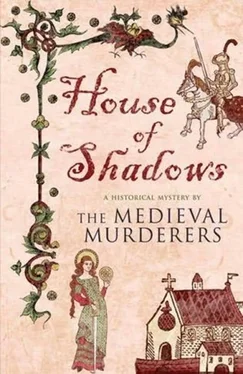‘You do not understand the situation, Master…Falconer, was it? You see, Brother Peter is ill.’
Falconer snorted in derision, at least glad to perceive that the pains in his head were receding. ‘And thrashing him to within an inch of his life will cure him?’
With difficulty, the prior retained his calm exterior. ‘Indeed, I hope it will. You see-’ he paused, clearly unwilling to divulge too much of the internal problems that beset him ‘-Brother Peter is vexed with demons.’
Falconer frowned, reluctant to brook such unscientific thought. Demons did not figure in Falconer’s pantheon of ailments. He offered an alternative guess as to what troubled the unfortunate monk. He knew that all too often the illness that caused a man to fall down in a fit and froth at the mouth was seen as demonic possession. Whereas the more skilled in medicine called it epilepsy, Falconer chose to use its old name. ‘He has the falling evil, then?’
Prior John de Chartres smiled sadly and shook his head. ‘I almost wish it were that disease. At least we then would know what to do and could take care of our brother. No. Unfortunately, we found him in frenesim – in a frenzy – and I do believe he has gone stark mad. It is fortunate we have a hospital here, where we formerly confined those with leprosy. Now that curse is receding, we use the old lazar house for the mad, the lame and the dumb.’
Falconer had heard of such hospitals. The inmates were not there to be treated but merely to be confined. He did not doubt that the bound and beaten figure of Brother Peter, now lying groaning in the centre of the church, would be chained up in such a place. If, as was likely, his so-called treatment was deemed to have failed. Falconer’s first impressions were vindicated. The priory did not seem to be a happy place to have stumbled on, and in other circumstances he would have moved on. But he had no other choices available to him. Outside the church, he could hear the rain beginning to fall heavily, and he needed a dry place in which to rest. With luck, it would be for only one night.
‘Hmm. Much as I doubt you can beat out the madness from his mind, I don’t know of any other way he can be cured. Perhaps a little kindness would help, though.’
The prior smiled wanly in response to Falconer’s admonition. He might have wished the man was not present to witness the problems he had suddenly had to deal with. But the requirement to provide hospitality to the traveller was paramount. He strove to change the subject to something less painful to his soul. ‘I imagine you wish to break your journey with us, Master Falconer. Especially with the weather turning so evil.’
As if on cue, a flash of lightning illuminated the outer courtyard in an eerie bluish glow, and a crack of thunder followed close on its heels. The frightened whinny of Falconer’s hired rounsey reminded him of the reason for his broken journey, and he hurried out into the driving rain to quieten the animal. Prior John de Chartres did not follow him out into the deluge. From the cover of the church’s western archway, he called out above the noise of the rising storm.
‘Take the horse around the rear of the church. A lay brother there will stable the beast for you. The guest quarters are in the hall beyond the infirmary. But beware, there is someone…’
There was a momentary hesitation in the man’s instructions, as though he had suddenly thought of another impediment to his new guest’s sojourn. However, Falconer, who was short of sight anyway, did not see the worried frown on the prior’s visage at such a distance and through the sheet of falling rain. Merely that the prior cast a look over his shoulder before again waving his arms to the right to emphasize where Falconer should go.
‘Well, you will see for yourself. Go that way before you drown. You will find the hall easily enough.’
He then disappeared inside the church again to deal with the problem of the mad monk.
Falconer shrugged his shoulders at the mysterious utterance of the prior and, bowing his head against the driving rain, led the rounsey around the north side of the church. Avoiding a brook that already ran in flood across the marshy ground beyond, he followed the prior’s instructions. He turned to the right around the grey and looming structures south of the church. Most abbeys and priories were similarly laid out, and Falconer guessed that the first outbuilding he came to was the infirmary where Brother Peter would soon be confined. It looked a grim and depressing place, and by the evidence of his nose the main cesspit for the priory abutted it close by. The final building in the range should be the guest quarters. And indeed, hugging close to the walls to shelter from the worst of the rain, Falconer soon discerned a bedraggled figure lurking in an archway that led to another inner courtyard. This would be the lay brother who would stable his horse.
The man beckoned him over and took the reins of the lame rounsey with nothing more than a grunt to welcome the prior’s unexpected guest. It was only as the man turned his back that Falconer’s eye was taken by a light in one of the upper windows of the guesthouse. He thought he saw the pale features of a person in the light of a flickering candle. Delving in his pouch, he produced his eye-lenses and fixed them on. But by then the vision was gone, the window dark, and, besides, the rain was smearing his view through the lenses.
When first he had commissioned the device to rectify his poor eyesight, it had been nothing more than two pieces of glass fixed at either end of a V-shaped bar of metal. He had had to hold it to his face to see clearly.
Dissatisfied, he had eventually crafted folding side-arms that wedged above his ears. For the first time ever, he had been grateful for the jutting nature of those appendages. Still and all, the eye-lenses were heavy and cumbersome, and he didn’t wear them regularly. He was thought eccentric enough already in the town of Oxford, and to wear eye-glasses all the time would invite ridicule. Taking the glasses off, and folding them, he called over to the lay brother.
‘Who was that at the…?’ He paused, unsure what he was asking. The man glanced up to where Falconer was pointing. Seeing nothing, he frowned and shrugged his apparently already burdened shoulders. Falconer sighed and decided he had seen nothing more than a false image in the flicker of lightning in the sky. That or a ghost, and he didn’t believe in ghosts.
‘Brother, where do I go?’
The man, who might have belonged to a silent order for all the conversation he had at his disposal, pointed a stubby finger at the doorway at the other end of the range from where the ghostly image had appeared. Falconer trudged under the arch and out of the rain.
The prior sat at the long oak table in his private chamber twisting the seal ring that adorned the little finger of his left hand. Before him lay a precious piece of fresh parchment on which he was contemplating writing a letter. This sheet was no palimpsest, used and rubbed clean for reuse, but bore a pristine surface. It was to carry a significant message to the parent house of St Mary’s, La Charité-sur-Loire. John de Chartres had thought long and hard about the contents of the letter, and even if it should be sent at all. But he was a cautious and meticulous man and did not want to be held to individual blame for the scandal he feared could soon be exposed. He cursed the day he had been given the commission of setting the priory back on its feet. Then, he had scorned the old tales of horror that went back to soon after the founding of the priory.
Shortly after his own landing on the shores of England, he had been told by a seafarer, who happened to reside near Rotherhithe, that the place he was going to bore a poor reputation. He had brushed off the remarks as the malicious rumours of tenants who resented paying the priory its dues. But almost as soon as he arrived at Bermondsey, one of the older brothers, Ranulf, had taken him aside.
Читать дальше












